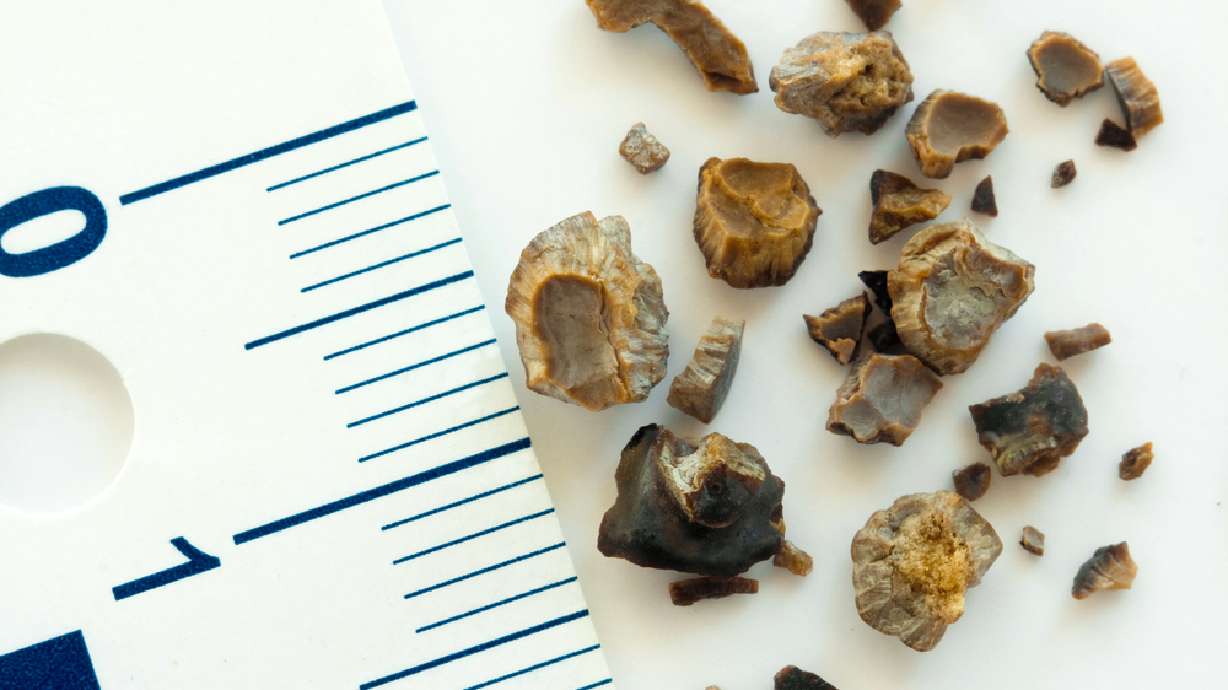Estimated read time: 4-5 minutes
This archived news story is available only for your personal, non-commercial use. Information in the story may be outdated or superseded by additional information. Reading or replaying the story in its archived form does not constitute a republication of the story.
Kidney stones — the small tormentors that cause men to wail for their mothers and women to plead for childbirth.
For the lucky ones, these stones will pass in a few days. For the not so lucky, it'll be a few more weeks of excruciating pain. More often than not, patients will opt for an earlier release from their temporary agony.
What is it about these tiny, harmless stones that makes them so painful and, most importantly, how do you make sure they never form again? With the help of Dr. Samuel Otto, urologist at Ogden Regional Medical Center, here's a guide to help you understand kidney stones.
What exactly are kidney stones?
Kidney stones are hard masses that form in the kidneys. The most common type is composed of calcium oxalate. Oxalate is found naturally in a lot of foods, such as fruits and vegetables, chocolate, colas and more. An increase in salt and animal protein diets can contribute to a greater concentration of oxalate as well. Other types of kidney stones include:
- Uric acid stone, which forms in dehydrated environments and has factors such as health issues (specifically gout) and genetics.
- Struvite stone, which forms due to infection (usually a urinary tract infection). These stones can grow big and fast.
- Cysteine stone, which forms due to a metabolic hereditary disorder of the kidneys.
Why are kidney stones so painful?
The stone itself, though made up of hard mineral deposit, is not painful. The pain you feel comes from urine backup that stretches the sensitive kidney. Then, as if that wasn't enough, there is excruciating pain when passing a kidney stone. And yes, it comes out as you may have guessed, through urine. According to Dr. Otto, many women tell him they would much rather give birth multiple times than suffer from another kidney stone.

How common are kidney stones?
About 5-8 percent of the population—from teens to seniors—will get kidney stones. The highest demographic of kidney stone patients are the middle age group, but that is because there are more people in that age group.
Unfortunately, if you already had one stone, your chances of getting another in the next five years increase by 50 percent (Yikes!).
You can, however, step up your prevention game and diminish the odds. And may they "be ever in your favor."
What causes kidney stones?
There are several contributing factors to kidney stones, including diet, genetics, being overweight, etc., but the main factor is dehydration. When you're dehydrated, your urine contains more particles that form stones than fluids that can dissolve those substances.

Tips:
- Drink a lot of water. Avoid too much salt.
- If you're going to drink soda, avoid colas. Instead, favor citrus sodas or juices as they contain high levels of citrate, which is a natural inhibitor of stones.
Are there any treatments?
Most kidney stones don't necessarily require any more treatment beyond water, pain relievers and endurance. However, in the cases that a stone is too big to pass, the pain is uncontrollable or you have fever and chills (which indicates an infection), there is extracorporeal shockwave lithotripsy (commonly referred to as ESWL).
ESWL produces sound waves that break up the stone into smaller pieces, hopefully making them more passable. There are some side effects to this procedure so, like with any procedure, consult an expert before you move forward with ESWL or even with surgery.
What can help prevent kidney stones?
As previously mentioned, the best prevention is hydration. You can also try your best to avoid animal protein and salt (but let's be real—they're in everything good). So drink lots of water and stay away from colas and, overall, high-sugar, high-sodium drinks.

When you come into MountainStar Healthcare with a stone, we collect a urine sample over 24-hours to see if it is especially concentrated with something like calcium or uric acid. With that information, we can help you modify your diet to lower your chances of getting another stone.
If you think you are susceptible to kidney stones and would rather not go through unimaginable pain, schedule an appointment today to see what we can help you with.









